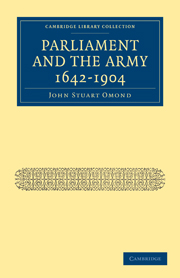Summary
Throughout the seventeenth and eighteenth centuries, the army suffered from the lack of any proper system of administration. Nor, indeed, was this serious defect remedied in an adequate manner until the latter half of last century. The system, if indeed it can be called a system at all, which had developed by the time of the French wars of 1793-1815, was the result of years of haphazard growth and was practically unworkable. If an officer were appointed to the command-in-chief, he was the nominee of the King, who in theory administered the army. Orders and regulations were issued by the Secretary-at-War. The Master-General of the Ordnance issued materiel and supervised the personnel of the artillery and engineers. The War Department was charged with the care of the cavalry and infantry. The Home Office was responsible for the militia and the volunteer corps of horse and foot. Boards of general officers were appointed to consider and advise on matters of importance to the army. The Treasury managed the transport and supply services. The office of Paymaster-General was much desired as a lucrative post, giving ample opportunity for self-enrichment to the holder. There were separate establishments for England and Scotland prior to 1707, and for Ireland until the Act of Union was passed by Pitt in 1800. These arrangements did not redound to the credit of the country, and complicated the difficulties of administering the army, both in peace and war. To understand subsequent developments of Parliament's efforts to obtain unfettered control of the army, it is necessary to consider the origin and growth of some of these offices.
- Type
- Chapter
- Information
- Parliament and the Army 1642–1904 , pp. 60 - 99Publisher: Cambridge University PressPrint publication year: 2009First published in: 1933

